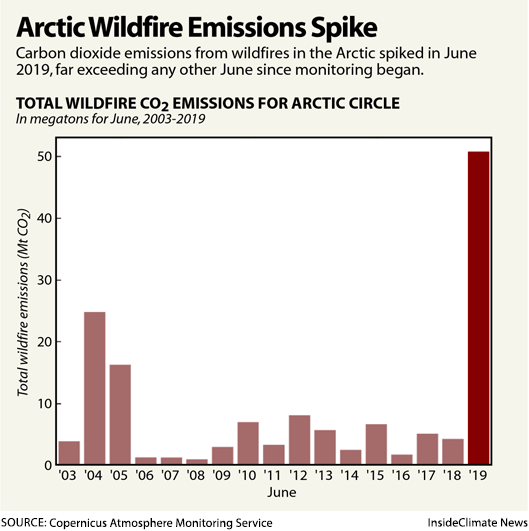Carbon Output From Arctic Circle Fires In June 2019 Alone Totaled 50 Million Tons
Deadly heat waves, wildfires and widespread flooding punctuated a decade of climate extremes that, by many scientific accounts, show global warming kicking into overdrive. As the year drew to a close, scientists were confidently saying 2019 was Earth’s second-warmest recorded year on record, capping the warmest decade. Eight of the 10 warmest years since measurements began occurred this decade, and the other two were only a few years earlier.
Arctic sea ice melted faster and took longer to form again in the fall. Big swaths of ocean remained record-warm nearly all year, in some regions spawning horrifically damaging tropical storms that surprised experts with their rapid intensification. Densely populated parts of Europe shattered temperature records amid heat waves blamed for hundreds of deaths, and a huge section of the U.S. breadbasket region was swamped for months by floodwater.
And wildfires burned around the globe, starting unusually early in unexpected places like the UK. They blazed across country-size tracts of Siberia, fueled by record heat, flared up in the Arctic and devastated parts of California. Australia ended the decade with thick smoke and flames menacing Sydney and a record-breaking heat wave that sent the continent’s average temperature over 107 degrees Fahrenheit. Again and again, scientists completed near real-time attribution studies showing how global warming is making extremes—including wildfires—more likely.
Even more worrisome, scientists warned late in the year that many of these extremes are linked and intensify each other, pushing the global climate system ever-closer to tipping points that could lead to the breakdown of ecological systems—already seen in coral reefs and some forests—and potentially trigger runaway warming.

Total wildfire carbon dioxide emissions for the Arctic Circle, 2003-2019. Data: Copernicus Atmosphere Monitoring Service. Graphic: InsideClimate News
EDIT
https://desdemonadespair.net/2020/01/2010-2019-earths-hottest-decade-on-record-marked-by-extreme-storms-deadly-wildfires-the-climate-of-the-20th-century-is-gone-were-in-a-new-neighborhood.html
